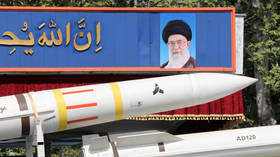Vienna talks could break Iran’s nuclear deadlock
Major nuclear powers are holding talks with Iran on how to supply its reactor with enriched uranium. Instead of enriching its own uranium, Tehran could soon be handing the responsibility over to other nations.
This could involve sending Iran's nuclear materials to other countries, like Russia and France, to be enriched up to safe levels.
Meanwhile, it has been reported that Iran might remove France from the list of bidders as Paris has failed to deliver its nuclear materials in the past.
However, accordingly to Vladimir Sotnikov from the Moscow-based Institute of World Economy and International Relations, even if Iran “abandons” France and the uranium will only be enriched in Russia, cooperation is still possible.
“This would be a good pretext for further negotiations with Iran on the whole complex of controversial issues concerning the Iranian nuclear program,” he said.
“But I cannot rule out that in this case the Iranian nuclear program would be regarded as fully peaceful,” Sotnikov added. “I mean that there still are other black spots on the Iranian nuclear program which are of major concern.”
Still, Iranian Nuclear Energy Organization spokesman Ali Shirzadian has said Iran will not stop uranium enrichment even if it gets nuclear fuel from abroad.
“Purchasing nuclear fuel from abroad does not mean Iran will stop its uranium enrichment activities inside the country,” told Shirzadian to Iran’s Islamic Republic News Agency.
Iranian uranium
After talks in Geneva earlier this month between the six world powers and Iran, Tehran agreed in principle to allow some of its uranium to be enriched in France and in Russia’s Angarsk plant in Siberia.
This would be turned into fuel and then be shipped back; a plan which Moscow says has many advantages.
“It is cheaper and more convenient to enrich the uranium in Russia, where the technology is available and has been proven for decades,” points out analyst of the Institute for World Economy and International Relations Aleksandr Pikayev. “The uranium will be of better quality and Iran will only gain from that.”
And while Iran gains from better quality fuel, the plan will also dampen down Western fears that Iran’s nuclear facilities are not for peaceful purposes
It will make use of the country’s existing stockpile of low enriched uranium, ending speculation that Iran has enough to build an atomic bomb.
Iran claims it has uranium with only a concentration of around 4% – well short of the 80%-90% needed to make nuclear weapons.
Despite this, and Iran's denial of intending to build a bomb, Western powers and the UN’s nuclear watchdog the IAEA, want to ensure they keep a close eye on Iran’s facilities. Russia says it is crucial that all parties are involved.
The head of committee of directors of Russia’s “Atompromresursi” Andrey Cherkasenko ponders says that “This plan can only happen with the consent of the IAEA and with several countries engaged in the operation. The uranium can be enriched in Russia, but further production of the fuel will need to be done in a third country, like France.”
Crucial talks in Vienna
It is hoped that the details can be hammered out during Monday’s meeting, which is being seen by all sides, including Iran, as a test to see if further cooperation can actually be achieved.
Washington has already warned it wants significant progress and if that doesn't happen it will again push for international backing of tougher sanctions.
Moscow has ruled out this option in favour of dialogue with Iran – but all that depends of whether Tehran is ready to talk.
Meanwhile, Russia will support any inquiries by the world's nuclear watchdog, the IAEA, into Iran's nuclear programme.
However, Foreign Minister Sergey Lavrov says no one has so far proved that the Iranian plans have a military element.
“Iran’s previous governments conducted secret research of the nuclear fuel cycle. IAEA inspectors have never been able to find anything prohibited there. But there are some questions remaining, and they need to be clarified. Iran has clarified many of them already,” Lavrov pointed out.
“But the IAEA wants to get satisfactory explanations on the remaining questions and we fully support it in this matter. Everything we are doing in Iran is fully legitimate and fully complies with the nonproliferation treaty and IAEA regulations. Everything is closely monitored by this agency,” stated Lavrov.
“As for the possibility of air strikes against Iran, no one has ever proven that Iran’s nuclear program has a military component. In fact, no one has ever proven that Iran ever wanted to have such a component,” Lavrov recalls.
However, political analyst Aleksandr Nagorny from the Association of Political Scientistsdoes not believe it is possible because of various forces in different countries that are against the deal.
“Not only is the US against that, in Iran itself there are powerful political figures that have interests in an indefinite confrontation against the US.”












